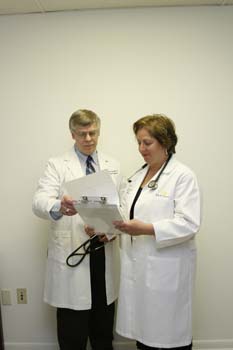| Back to Back Issues Page |
 |
|
VBPM Connection, Issue #021 -- News from your doctor's office. May 06, 2012 |
The Virginia Beach Premier Medical NewsletterMay, 2012
VBPM Connection is a newsletter published by Virginia Beach Premier Medical, an internal medicine practice dedicated to personalized, highly attentive, high quality care for our patients. The newsletter provides information of a general nature about our office, current health news and various common illnesses and ailments. None of the information provided is meant to be specific for any particular individual. Always seek the advice of your personal physician for any specific information about your health.
If you have a topic that you would like to see appear in the newsletter, please let us know at gjwarth@gmail.com.
Potential New Treatment for Alzheimer's
Alzheimer's Disease appears to be caused by the deposition of a protein called beta-amyloid in the brain. A naturally-occurring lipid in the body called apolipoprotein E can help to get rid of beta-Amyloid. A Canadian team of investigators has found that a chemical called bexarotene can increase the amount of apoE in the brain and thereby reduce the amount of amyloid. In mice, the drug has been able to reverse cognitive deficits. More studies will need to be done to see if it works as well in humans. There's still a long way to go before this will be ready for prime-time if ever, but it sounds promising.
Health Information Technology
Health information technology is advancing, although probably not as rapidly as the technology in other fields. Nevertheless, with the advent of electronic medical records and the push toward eventually having all these different systems be able to communicate with each other, physicians, hospitals and patients will all benefit. Patients will get better care and will have better access to their own records. EHR- Electronic Health Records - These systems keep patient information secure within computerized, digitized charts that can be accessed by your physician at the office and even from home if necessary using password protection. The current problem is that there are so many different EHR software systems that don't "talk" to each other. This hinders the process of getting the right information to your doctor at the time of your office visit. Experts are working on fixing this so that your records will be more accessible to those who need them, all being done with privacy concerns at the forefront of the discussions. Many surveys, however, show that most patients are less concerned about privacy than they are about getting the information to where it needs to go. The following website will provide an update on the terminology and what is happening now in the arena of health information technology... http://www.healthit.gov/patients-families/health-it-terms
Autism: New Potential Treatments for the Future?
Recent studies by 3 independent research groups have found strong evidence that genetic mutations are contributing to the cause of autism in many cases. This may ultimately lead to finding neurochemical abnormalities produced by these abnormal genes which potentially could allow for future pharmacologic treatment (medications) to help these patients.
Provent: New Treatment for Sleep Apnea
Sleep apnea is a very common disorder in which people often stop breathing temporarily during the night due to upper airway narrowing or partial obstruction by the back of the tongue and soft tissues of the neck and pharynx. Treatment options include losing weight, using a dental appliance, or the using a CPAP (Continuous Positive Airway Pressure) machine requiring wearing a tight mask which is very uncomfortable and which many patients just cannot tolerate for long enough for it to do any good. If not treated, sleep apnea can lead to chronic heart and respiratory problems.
A new product called Provent is now available for the treatment of sleep apnea. It consists of two small nasal bandaid-like appliances that contain one-way valve openings in the center of each device. They are applied to the opening of each nostril so that it's easy to breathe in through the nostrils, but harder to breathe out. This increases the internal airway pressure that will force the airway to stay open and help to prevent snoring and control sleep apnea. So, if you have sleep apnea, and if you have been prescribed a CPAP device that you find to be intolerable, you may want to consider using Provent. It is more expensive to use Provent over time because the devices are disposable, so you have to use two new ones every night. However, it may be just the right thing to help you with your sleep apnea. Not everyone will benefit from Provent and you might require a follow up sleep study to see if it works for you. Go to the following website to learn more about it...
Dermagel for Skin Tears or Sores
Along with age come many changes in our bodies, not the least of which is thinning and atrophy of the skin, which is easily opened or torn or bruised at the slightest provocation. There's not much that we can do medically to prevent this, but when a skin tear occurs, we often cover it with a bandaid or a gauze pad which ultimately sticks to the wound and tears it even further when we try to change the dressing. Dermagel is a new product that really works well for these lesions. It comes in a large soft gel-like pad that you can cut to any size with regular scissors. You can then apply a small amount of Bacitracin or Neosporin to the wound and place the cut-out pad over top. Then put a bandaid or gauze wrap over that. You can leave it on for 2-3 days and then change it. The skin tears usually heal up very well. Read more about it at the following website... http://www.medline.com/wound-skin-care/derma-gel
Mammograms
The controversy about when to do screening mammograms has been in the news again recently after an article appeared in the Annals of Internal Medicine outlining risk factors for breast cancer in women from 40-50 years of age. Breasts are more dense then, which makes mammography more difficult to interpret, often leading to both false negative and false positive results. False negative results lead to some breast cancers being missed, and a false sense of security that everything is okay when it may not be. False positive results often lead to over-diagnosis , unnecessary breast biopsies and lots of psychological stress.
The National Cancer Institute recommends a somewhat nebulous policy of screening-mammograms every 1-2 years for women in the 40-50 age range, and then yearly thereafter. Digital mammography may be helpful for younger women (under age 50) who have dense breasts, but there is controversy about that as well. If you are a woman between 40 and 50, the best thing to do is discuss it with your physician. Your personal medical history or family history can help determine your potential risk for developing breast cancer, which can then lead to a personalized plan for how often you should have screening mammograms done.
Prostatitis
Prostatitis is an infection or inflammation of the prostate gland which is located in the male pelvic area behind the pubic bone and surrounding the urethra as it exits from the urinary bladder.
The inflammation can be acute or chronic and causes aching discomfort in the pelvic area, increased urinary urgency and frequency, and, in the acute setting, can cause fever, chills, fatigue, general weakness and even blood stream infections. Acute prostatitis can lead to chronic prostatitis in about 5% of cases. The diagnosis can be made by the physician based on symptoms, prostate examination and/or urine testing. Treatment usually requires taking an antibiotic for several weeks or months. It takes several days or even one-two weeks after the beginning of treatment to get the symptoms under control. The PSA level, which is a cancer-screening blood test, may be quite elevated during an acute episode of prostatitis, but then comes back to normal later after the infection has resolved.
Travel Information
If you're thinking about doing any traveling this summer, especially if you are going out of the U.S., make sure you plan ahead. Get all the health information you need to know about the area to which you are traveling and be prepared before you go.
Many parts of the world have endemic diseases that are not common in this country. These diseases are often food-borne, water-borne, air-borne or are spread by insects, or even come from the soil. Make sure you are aware of what these illnesses are and protect yourself from them if at all possible. Be sure you are up to date on all the common immunizations that you should be receiving anyway according to current guidelines - like flu, pneumonia, shingles, measles, mumps, polio, tetanus, diphtheria and pertussis. Then there are the extra vaccines or preventive medicines that you will need for certain countries - like Hepatitis A and B, typhoid, yellow fever, malaria and others. Some of these may need to be started at least 6 weeks before departure. You should take along a filled prescription for certain antibiotics to treat acute infections that you might develop while you are there, such as traveller's diarrhea. You can find this information at the following website: http://wwwnc.cdc.gov/travel/destinations/list.htm or by calling or visiting Passport Health in Virginia Beach:
Medication Samples
There has been some controversy about the use and distribution of medication samples to patients who are being tried on new medications. As with most everything else, there are pros and cons.
The concern is that pharmaceutical representatives will influence prescribing practices by physicians that will more likely result in prescribing a new product (promoted by the drug company) that is more expensive than a similar older product. Once the patient starts on the sample of the new drug given by the physician, if it works well, then the tendency is to want to continue the same drug even though it may be more expensive than the alternative. The advantage to using samples is that patients can try out a new drug for free to be sure it works (and that it doesn't cause unwanted side effects) before actually having to pay for the drug at the pharmacy for long term use. This can potentially save patients a lot of money. At VBPM, we believe in offering samples to our patients. We further believe that doctors and patients are smart enough to figure out whether a particular drug is good for them or not, taking into account all the factors of cost, effectiveness, side effects, etc. without being "influenced" by pharmaceutical marketing.
About Our Office
Virginia Beach Premier Medical is a membership internal medicine practice specializing in comprehensive and compassionate, individualized and personalized patient-centered care. We pride ourselves on full continuity of care – in the office, in the hospital, or even at home.
Hospital Care
One of the many services that we provide at VBPM and perhaps one that we're most proud of is the fact that we provide hospital care for our patients when they need it. Most other primary care offices - internists and family practitioners alike - do not follow their patients when they are the most ill and when they require hospitalization. In stark contrast to these other practices, however, we always do follow our patients whenever they are hospitalized at either Sentara Virginia Beach General or Princess Anne Hospital. This is not pat-on-the-back care. This is intensive involvement and coordination of care by your personal physician - the same one you see in the office. It's not easy and requires a considerable amount of time and extra effort, but we feel it is an extremely important service provided by your VBPM physicians. You should always know and feel secure that, as long as you are a member of VBPM, you will receive personalized attention and coordinated medical care by your VBPM doctors.
If you would like more information about our practice please call us at 757-416-6750 or visit our website at www.vbpm1.com. Ask to speak with Brittany, our office manager, or Dr. Parks or Dr. Warth. We’d be happy to talk with you anytime.

Happy Spring!!! |
| Back to Back Issues Page |


